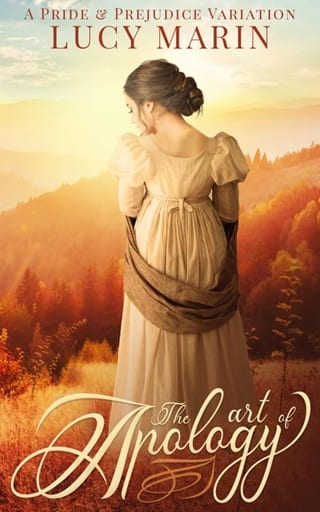Chapter 21
CHAPTER TWENTY-ONE
T wo days after seeing the Miss Bennets in Meryton, Darcy went for an early morning ride hoping he would encounter Miss Elizabeth as he had previously. As soon as he had seen Wickham, he had been overtaken by a twin yearning to kick him and pull her away in order to protect her, determined that he would not fail her as he had Georgiana. This strong desire had faded into a more reasonable decision to advertise something of his history with the scoundrel so that the Miss Bennets and other young ladies would be on their guard. He would begin by speaking to Miss Elizabeth and then Mr Bennet or some other gentleman.
He coaxed Budge into joining him, believing Miss Elizabeth would be pleased to see him again. When the ridiculous dog had been unwilling to leave his comfortable spot by the fire, Darcy had stooped to whisper that he might see her if he did. It had to be coincidence that Budge had then stood and shaken himself, making his white fur look even more unkempt than usual .
“Well, there is nothing for it,” Darcy had said, scratching his faithful companion’s ears. “Fortunately, she is not the sort of lady whose feelings for you depend on your looks.” It was yet another of her admirable qualities; he was discovering that there were a great many.
Any attempt to make Budge more presentable might be the difference between meeting Miss Elizabeth that morning or missing her. It was important that he speak to her before Wickham had a chance to spread his usual lies. He would have liked to have done it sooner—immediately—but circumstances had not permitted it. Darcy hoped he had done enough that people would find it difficult to believe the worst of whatever his former friend said, though it was always possible, even probable, that Wickham would make up ever more outrageous stories in his quest to ensure he was loved and Darcy was hated. Although he did not want anyone to think poorly of him, the person whose opinion most mattered was Miss Elizabeth. What had begun as a wish to make her think better of him had altered into something far greater, and it was increasingly difficult to overlook that he liked her more than any other lady of his acquaintance.
Sure enough, when they were about halfway to Longbourn, Budge barked several times and ran off; Darcy found him with Miss Elizabeth a moment later. Once again, she was crouching, giving the dog the attention he apparently desperately needed—as suggested by his frantically wagging tail and enthusiastic attempts to lick her face .
“Mind your manners!” Darcy cried; he tried to pull Budge away from her, but she only laughed.
“How could I object?” she asked. “I am seldom greeted so gleefully. You will spoil me, noble Budge, and make me think entirely too well of myself.” She kissed the top of his head and accepted Darcy’s offer of a hand to help her stand.
They strolled, the exercise necessary in light of the November chill and the shaded path they were on. He listened with growing anger as she told him of her conversation with Wickham at her aunt’s house the previous evening. Sure enough, he had told her the usual lies. If he feels she did not believe him, at the next opportunity, he will add that I gamble excessively and have been known to prefer less than respectable company.
“I do not know that I can even call it a conversation,” she said. “I was a most unwilling participant, I assure you, but I had the impression he had information he wished to convey, and nothing would stop him.”
“You must wonder whether any part of it is true,” he said, keeping his gaze forwards, despite being tempted to glance at her. She walked beside him, and he was nervous that he might see suspicion in her eyes, but the tone of her voice gave him reason to hope she felt none.
“I suppose I am curious what the basis for his tales is. I do not believe you are a reprobate, as he was clearly suggesting, but do not exaggerations or lies often begin with some element of truth, some little thing the teller bends and twists to suit their purposes?”
Darcy shrugged. “From what I can discern, the only truthful elements are that we have known each other all our lives and were raised in Derbyshire. My father, who was his godfather, was fond of him, I admit. Wickham’s own father was Pemberley’s steward. He was an excellent man, and I know that my father believed George would grow up to be just like him.” He had once expected the same, and disappointment at what had happened momentarily robbed him of speech.
Miss Elizabeth touched his arm and said, “But he did not?”
Shaking his head, Darcy went on. “My father never saw the signs that father and son were as different as could be, though I did. I was never jealous of George. If anything, he was jealous of me, of my position in life and especially my wealth. I have often thought that the differences between us and what that meant for our futures became more apparent to him as we went through adolescence, and with it, he grew to despise me. My father found him amusing and took an interest in him. He provided Wickham with an education and promised him a valuable living if he chose to go into the church. It is completely untrue that my father liked him more than me. My father liked him, but he loved me. It was me that he taught to ride and fish and shoot, me he took with him wherever he went, and for whom he bought the finest gifts. Confided in and sought comfort from during his final illness.”
He fell silent, remembering those difficult months. Miss Elizabeth slipped her arm around his. She must have sensed that he would find it more soothing than words, and he appreciated her quiet support.
After a brief pause, he continued. “My father and I travelled during the brief period it was safe, almost a decade ago now, and when we returned, I saw at once how Wickham had changed. He had made new friends in my absence, ones that encouraged him to…live a more dissolute life, which he was able to keep hidden from our fathers. He was enraged by the terms of my father’s will—chiefly that he had only been left one thousand pounds rather than the thousands he apparently feels were his due.” He went on to tell her that Wickham had disclaimed any interest in the church and had been paid three thousand pounds in place of the living.
“So much money!” she cried. “He told me he was poor. How can he now have nothing?”
Darcy could only shrug again. “Living beyond his means, and I understand he is excessively fond of gambling. He has a tendency to leave debts behind him wherever he goes.” He would have to ensure the local shopkeepers knew not to give Wickham credit—and to protect their daughters from him. “I am sorry. I have perhaps said too much. I do not wish to distress you.”
“You need have no concern for me. I can see it distresses you to recall it. I wish I had discouraged you from doing so.”
He ran a hand over his face, accidentally knocking his hat from his head. As soon as he stopped to pick it up, Budge lay down and rested his head between his paws.
Miss Elizabeth giggled. “He is a silly thing. Adorable but silly. Shall we let him rest?” She gestured to a large rock at the side of the path that was in the sun, and when he nodded, they sat.
Neither of them spoke for a while, and he found the quietness peaceful; it was only disrupted by Budge’s soft snores and the rustling of wind through the trees. The strength of his wish to tell her everything surprised him. Did he trust her enough? When the words poured from his mouth and he explained what had happened at Ramsgate the previous summer, he had his answer: he did.
Her shock was everything he knew it would be—as was her anxiety for Georgiana. “Your poor, poor sister. How she must have suffered. She was only fifteen? That is Lydia’s age! I pray she is well now, though if you say she remains affected, I would not be surprised.”
“She is doing well, quite well, from what my aunt tells me. My sister is staying in the country with my mother’s brother and his wife. One of their sons is Georgiana’s other guardian. There are times I believe I have taken Wickham’s betrayal to heart more than she has. But we were friends. I believed we always would be. I rejoiced when my father spoke of reserving the Kympton living for Wickham because it is so close to Pemberley. He and I would always live near to one another. There would be no impediment to our friendship, our children would grow up together as he and I had…” He sighed heavily. “Instead, he became a man I could not like or respect, one that I would wish never to see again—and that was before he attempted to use my sister to revenge himself on me.”
“And this all happened just weeks before you came to Netherfield,” she said gently.
Darcy turned to face her, his eyes meeting hers. “ Please do not excuse how I acted then. It is true I was in a foul mood. Even Bingley noticed it. I believe he said I was insufferable, or he might only have implied it. I was angry and betrayed, partly because I could do nothing about what had happened. Which authority could I tell that would have made a difference, that would stop Wickham from treating another young lady as he had my sister, or injuring some other man who had considered him a friend? What could I do that would not risk Georgiana’s reputation?”
“Those are questions to which I do not have answers, but I do not believe you expect me to. Very well, Mr Darcy, I shall not excuse you. Indeed, I did not intend to, but it does provide an explanation, especially when added to knowing you overheard people speculating about you, which you have said you hate, as most people would.”
They remained where they were a while longer. Darcy almost told her about the ball Bingley had decided to hold and requested that she reserve a set for him, but he should first ask Mr Bennet for his permission. It was ridiculous to do so for a dance, but it would show the older gentleman respect that he might appreciate, given their unusual situation. Mr Bennet must have seen him and Miss Elizabeth speaking at Haye-Park during the recent card party, but that did not mean he would approve of them standing up together for half an hour. Bingley was planning to go to Longbourn that afternoon to deliver the invitation to the ball, and Darcy determined that he would go with him. He would speak to Mr Bennet about Wickham and the ball, and, if granted permission—as he expected he would be—he would ask her then.
 Fullepub
Fullepub 



